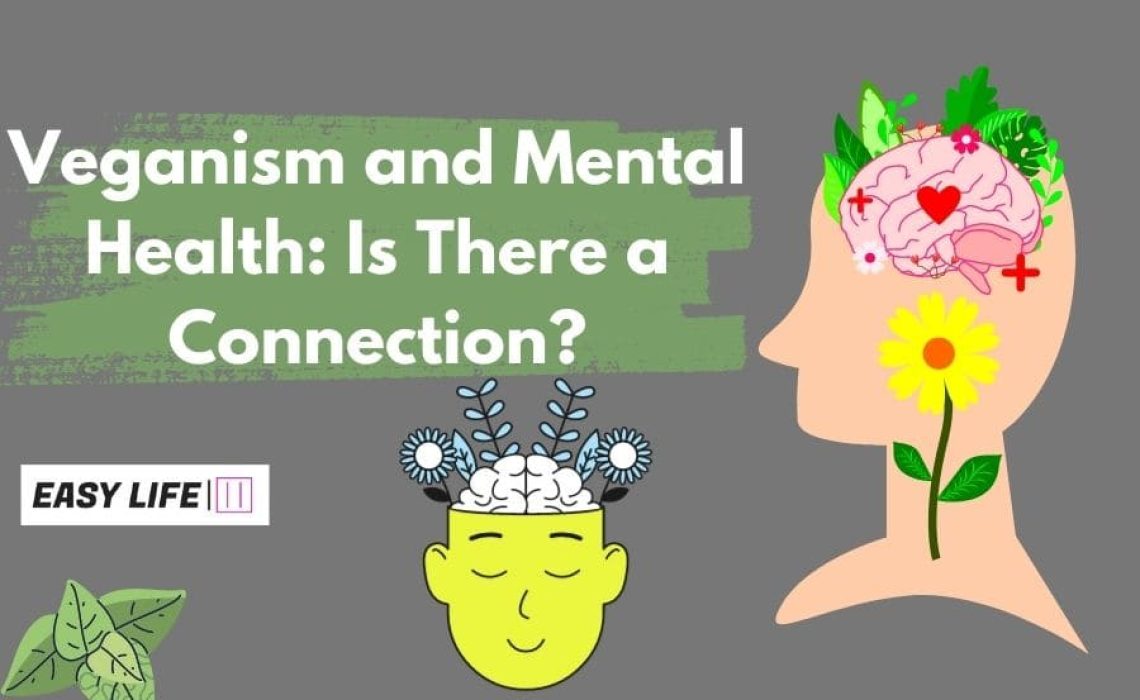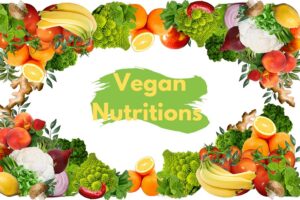In an era where self-care and well-being are in the limelight, understanding the potential links between diet and mental health has never been more critical. As more individuals adopt plant-based diets, particularly veganism, it’s crucial to explore the impact of these lifestyle choices on various aspects of health, including mental health.
Veganism, a dietary approach that excludes all animal products, has gained popularity due to its potential health benefits, environmental sustainability, and ethical considerations. Mental health, on the other hand, relates to our emotional, psychological, and social well-being and profoundly affects how we think, feel, and act.
In this blog post, we will delve into the possible connections between veganism and mental health. We will examine relevant research, discuss potential benefits and concerns, and share tips on balancing a vegan diet for optimal mental health. Whether you are a seasoned vegan, contemplating the shift towards a plant-based lifestyle, or a mental health advocate, this exploration provides valuable insights into the intersection of diet and mental health.
Table of Contents
Toggle1. Understanding Veganism
Veganism, as a lifestyle choice and dietary practice, is the abstention from consuming or using any animal products. This philosophy extends from food to clothing, personal care items, and more. The core principle of veganism is a deep respect for animal rights, with the belief that animals should not be exploited for human consumption or use.
Over the years, veganism has gained considerable momentum, extending beyond the realm of animal rights activism. The reasons individuals adopt veganism have become multifaceted, including health motivations, environmental concerns, and ethical considerations.
From a dietary perspective, a vegan diet excludes all animal-derived products. This includes meat, poultry, fish, dairy, eggs, and even honey. Instead, a vegan diet focuses on plant-based foods like fruits, vegetables, grains, legumes, nuts, seeds, and various fortified foods.
Vegans rely on these plant-based foods for their nutrition, focusing on a balance of macronutrients (carbohydrates, protein, and fats) and micronutrients (vitamins and minerals). It’s important to note that the nutritional adequacy of a vegan diet depends largely on the variety and balance of foods consumed, as well as appropriate supplementation for nutrients harder to obtain from plant sources.
Having established an understanding of veganism, let’s move on to exploring the concept of mental health and its significance in our lives.
2. An Overview of Mental Health
Mental health refers to our cognitive, behavioural, and emotional well-being – it is all about how we think, feel, and behave. According to the World Health Organization (WHO), mental health is “a state of well-being in which an individual realizes his or her own abilities, can cope with the normal stresses of life, can work productively and is able to make a contribution to his or her community.”
Mental health is a vital aspect of overall health and well-being. It influences our thoughts, feelings, and actions, as well as our ability to handle stress, relate to others, and make decisions. Mental health isn’t just the absence of mental health problems or disorders. It also involves a positive sense of well-being or mental wellness.
Common mental health disorders include depression, anxiety disorders, bipolar disorder, schizophrenia, other psychoses, dementia, and developmental disorders including autism. These conditions can significantly impact a person’s thinking, feeling, mood, and behaviour, and each has its own symptoms and treatment approaches.
In recent years, researchers have started exploring how our diets may affect our mental health. The brain, after all, requires adequate nutrition to function optimally – just like all other organs in our body. This brings us to the question at the core of this blog: what is the connection between veganism and mental health? As we delve into this topic in the following sections, we’ll review existing research and discuss potential benefits and concerns.
3. Veganism and Mental Health: Examining the Research
As interest grows in the relationship between diet and mental health, several studies have attempted to examine the potential impacts of a vegan diet on mental health. These investigations are part of a larger field of study known as nutritional psychiatry, which looks at the role of diet in brain health.
However, the research on veganism and mental health is far from conclusive. While some studies suggest that vegans may have lower stress and anxiety levels, others point out potential risks if the diet leads to deficiencies in nutrients crucial for brain health.
A 2015 study in the journal “Nutritional Neuroscience” found that vegans (and vegetarians) had lower scores on depression tests and mood profiles when compared to omnivores. Similarly, a 2018 study published in the “American Journal of Health Behavior” suggested that plant-based diets could be effective in promoting mental health.
On the other hand, some studies have linked a vegan diet with a higher risk of mental health disorders. For instance, a study published in “Critical Reviews in Food Science and Nutrition” in 2017 showed a higher prevalence of depressive symptoms among vegetarians and vegans. However, it’s essential to note that these associations don’t necessarily prove cause and effect.
It’s also important to consider the potential for nutrient deficiencies in a vegan diet, which might impact mental health. Vitamins B12 and D, omega-3 fatty acids, and minerals like iron and zinc, all crucial for brain health, can be more challenging to obtain from a vegan diet.
Therefore, while some research suggests potential mental health benefits of a vegan diet, it’s crucial to ensure that the diet is well-planned and nutritionally complete. Let’s now take a closer look at how certain aspects of a vegan diet could potentially influence mental health.
4. Potential Benefits of a Vegan Diet on Mental Health
A well-planned vegan diet is rich in certain nutrients that might positively influence mental health. Some potential benefits include:
A. High in Fruits and Vegetables:
A vegan diet emphasizes the consumption of fruits and vegetables, both rich in nutrients like antioxidants, dietary fibre, and phytochemicals that have been associated with better mood and lower risk of depression.
B. High in Whole Grains and Legumes:
These foods are excellent sources of complex carbohydrates, which help regulate blood sugar levels and thus mood and energy levels throughout the day. They are also rich in B vitamins, essential for brain health.
C. Rich in Omega-3 Fatty Acids:
While commonly associated with fish, omega-3s can also be found in plant sources such as flaxseeds, chia seeds, hemp seeds, walnuts, and fortified foods. These fats are essential for brain function and may help reduce symptoms of depression and anxiety.
D. Fiber and Gut Health:
Vegan diets are typically high in dietary fibre, which aids digestion and supports a healthy gut microbiome. Emerging research suggests a connection between gut health and mental health, known as the gut-brain axis.
E. Ethical and Psychological Benefits:
For many people, the ethical choice to avoid animal products may bring psychological benefits, including alignment of actions with personal values, which may contribute to overall mental well-being.
F. Potential Lower Inflammation Levels:
A plant-based diet may lower systemic inflammation due to its high content of antioxidants and fiber. Since inflammation has been linked with mental health disorders like depression, a lower inflammation level might contribute to improved mental health.
While these benefits seem promising, it’s important to note that more research is needed to fully understand the relationship between these factors and mental health. Also, just as a vegan diet can have potential benefits for mental health, it also carries potential concerns, which we will explore in the next section.
5. Potential Concerns about Veganism and Mental Health
While there are potential benefits to a vegan diet for mental health, there are also possible concerns to be aware of. These mostly relate to nutrient deficiencies that could arise from a poorly planned vegan diet, as some essential nutrients are more challenging to obtain from plant-based sources.
A. Vitamin B12 Deficiency:
Vitamin B12 is vital for brain function and mental health. It’s naturally found in animal products, and deficiency can lead to serious neurological problems and depression. Vegans need to ensure they get enough B12 from fortified foods or supplements.
B. Omega-3 Fatty Acids:
These fats are crucial for brain health and mood regulation. While they can be obtained from certain plant foods, the form of omega-3 found in plants (ALA) is not as efficiently converted to the active forms (EPA and DHA) in our bodies. Vegans may need to consider fortified foods or algae-based supplements.
C. Iron and Zinc:
While these minerals are found in plant foods, they are not as easily absorbed by our bodies as the iron and zinc from animal sources. Deficiencies in these minerals can negatively affect mood and cognitive function.
D. Vitamin D:
This vitamin plays a role in brain development and function. It’s challenging to get enough vitamin D from food alone, and it’s often synthesized in our bodies through sunlight exposure. Inadequate levels can contribute to depression. Vegans may need to consider fortified foods or supplements, especially in winter months or for those living in less sunny climates.
E. Protein:
While getting enough protein on a vegan diet is entirely possible, some vegans may not get a sufficient variety of protein sources to provide all the essential amino acids, which are crucial for neurotransmitter production and overall brain health.
F. Social and Psychological Factors:
Adopting a vegan diet can sometimes lead to feelings of social isolation or stress around food choices, particularly in social situations where vegan options may be limited. These feelings could potentially impact mental health.
Despite these potential challenges, with careful planning and a good understanding of nutrition needs, it’s possible to follow a balanced, healthful vegan diet that supports both physical and mental health. Let’s move on to explore how to balance a vegan diet for optimal mental health
Transitioning to Veganism: A Step-by-Step Guide
6. Balancing a Vegan Diet for Optimal Mental Health
Following a vegan diet can be nutritionally adequate and beneficial for mental health if appropriately planned and balanced. Here are some tips to achieve this:
A. Variety is Key: Ensure you are eating a wide range of plant foods to maximize your nutrient intake. This includes fruits, vegetables, legumes, whole grains, nuts, and seeds.
B. Consider Fortified Foods and Supplements: Some nutrients, like vitamin B12 and vitamin D, are harder to obtain from a vegan diet. Fortified foods and dietary supplements can help fill these gaps. Consult with a healthcare professional to determine what’s best for you.
C. Include Omega-3s: Flaxseeds, chia seeds, hemp seeds, walnuts, and algae-based supplements are excellent vegan sources of omega-3 fatty acids.
D. Mind Your Minerals: Include plant-based iron sources like lentils, chickpeas, and fortified cereals in your diet, preferably combined with vitamin C-rich foods to enhance absorption. For zinc, opt for foods like whole grains, tofu, legumes, nuts and seeds.
E. Emphasize Whole Foods: While vegan junk food exists, it’s vital to focus your diet around whole, minimally processed foods for optimal health.
F. Consult a Dietitian or Nutritionist: If you have specific concerns about your diet or mental health, consider consulting a registered dietitian or nutritionist, preferably one experienced in vegan diets.
G. Seek Support: Joining vegan community groups or forums can provide emotional support, practical tips, and a sense of belonging.
Remember that while diet can contribute to mental health, it is only one piece of the puzzle. Regular exercise, adequate sleep, stress management, and professional mental health support when needed are also vital components of mental well-being. With a well-balanced approach, a vegan diet can fit into a lifestyle that supports both physical and mental health.
7. Conclusion
The connection between veganism and mental health is a complex and evolving topic, shaped by various factors ranging from nutrition to individual values, societal factors, and beyond. While a vegan diet can offer numerous health benefits, it’s important to remember that any dietary choice should be balanced and carefully planned to ensure nutritional needs are met.
Research on the impact of veganism on mental health is ongoing, with some studies suggesting potential benefits and others highlighting possible concerns. Ultimately, the key lies in ensuring a balanced and varied diet that provides all the necessary nutrients, alongside a lifestyle that supports overall mental well-being.
As we conclude, remember that each person’s journey with veganism and mental health is unique. It’s crucial to listen to your body and mind and seek professional guidance as needed. Whether you’re a seasoned vegan or contemplating a shift towards a plant-based lifestyle, we hope this exploration has provided valuable insights into the interplay between diet and mental health.
Your diet is just one part of your life that can influence mental health. Regular physical activity, adequate sleep, stress management, and seeking help when needed are also vital. Health is holistic and multifaceted – and every step taken towards a healthier body and mind is a step worth taking.
8. References
- Beezhold, B., Radnitz, C., Rinne, A., & DiMatteo, J. (2015). Vegans report less stress and anxiety than omnivores. Nutritional Neuroscience, 18(7), 289–296.
- Agarwal, U., Mishra, S., Xu, J., Levin, S., Gonzales, J., & Barnard, N. D. (2018). A Multicenter Randomized Controlled Trial of a Plant-Based Nutrition Program to Reduce Body Weight and Cardiovascular Risk in the Corporate Setting: The GEICO Study. European Journal of Clinical Nutrition, 72(7), 947–959.
- Hibbeln, J. R., Northstone, K., Evans, J., & Golding, J. (2018). Vegetarian diets and depressive symptoms among men. Journal of Affective Disorders, 225, 13–17.
- Medawar, E., Huhn, S., Villringer, A., & Veronica Witte, A. (2019). The effects of plant-based diets on the body and the brain: a systematic review. Translational Psychiatry, 9(1), 226.
- Dinu, M., Abbate, R., Gensini, G. F., Casini, A., & Sofi, F. (2017). Vegetarian, vegan diets and multiple health outcomes: a systematic review with meta-analysis of observational studies. Critical Reviews in Food Science and Nutrition, 57(17), 3640–3649.
- Foster, M., Chu, A., Petocz, P., & Samman, S. (2013). Effect of vegetarian diets on zinc status: a systematic review and meta-analysis of studies in humans. Journal of the Science of Food and Agriculture, 93(10), 2362–2371.
- Carr, A. C., & Maggini, S. (2017). Vitamin C and Immune Function. Nutrients, 9(11), 1211.
- Jacka, F. N., O’Neil, A., Opie, R., Itsiopoulos, C., Cotton, S., Mohebbi, M., Castle, D., Dash, S., Mihalopoulos, C., Chatterton, M. L., Brazionis, L., Dean, O. M., Hodge, A. M., & Berk, M. (2017). A randomised controlled trial of dietary improvement for adults with major depression (the ‘SMILES’ trial). BMC Medicine, 15(1), 23.
Please note that these references provide a starting point for readers interested in this topic, and they should not be considered an exhaustive list of relevant studies.
9. Related Books
Here are some books related to veganism, nutrition, and mental health. They provide further reading for those interested in exploring the interconnectedness of diet and mental well-being:
- “How Not to Die: Discover the Foods Scientifically Proven to Prevent and Reverse Disease” by Dr Michael Greger and Gene Stone. This book provides evidence-based recommendations for a plant-based diet’s health benefits.
- “The Mind-Gut Connection: How the Hidden Conversation Within Our Bodies Impacts Our Mood, Our Choices, and Our Overall Health” by Emeran Mayer. This book explores the complex relationship between our brain and the gut, highlighting the influence of diet on mental well-being.
- “The Vegan Starter Kit: Everything You Need to Know About Plant-Based Eating” by Dr Neal Barnard. This a handy guide for anyone considering adopting a vegan diet, offering practical advice and nutritional information.
- “Eat Complete: The 21 Nutrients That Fuel Brainpower, Boost Weight Loss, and Transform Your Health” by Dr Drew Ramsey. This book delves into the critical role nutrition plays in brain health, mental well-being, and overall health.
- “The Spectrum of Hope: An Optimistic and New Approach to Alzheimer’s Disease and Other Dementias” by Dr Gayatri Devi. While not entirely about veganism, this book discusses the role of lifestyle, including diet, in brain health.
- “The China Study: The Most Comprehensive Study of Nutrition Ever Conducted And the Startling Implications for Diet, Weight Loss, And Long-term Health” by T. Colin Campbell and Thomas M. Campbell II. A comprehensive look at the implications of whole food, plant-based diet.
Please note that while these books offer valuable insights, it’s essential to approach any health-related advice with critical thinking and consult with healthcare professionals for personalized advice.









